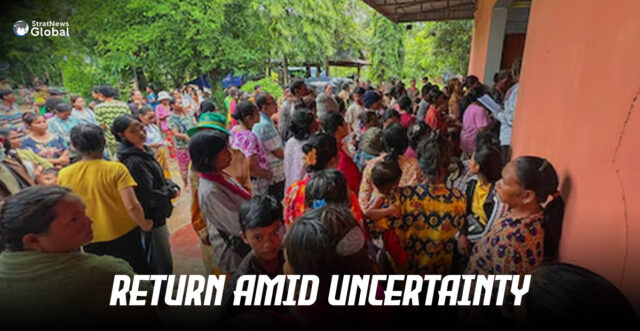Along Cambodia‘s northwestern border, residents in temporary refugee shelters awaited their return home on Tuesday following a fierce five-day conflict with neighbouring Thailand, which concluded with a ceasefire taking effect Monday night.
“If they (the government) say that my village is safe to return, then I would go back home and reunite with my family because here is not as easy to live as my home,” said Meun Saray, a 45-year-old woman holding a child under a tarpaulin shelter in a muddy field near the border town of Samraong.
Residents Flee
Samraong, capital of Cambodia’s Oddar Meanchey province, was almost completely deserted on Monday, with most of its shops shuttered and its roads eerily quiet after many of its 70,000 residents fled the conflict.
About 320 km (200 miles) from the capital Phnom Penh, the town was caught in the middle of the most intense fighting between the two countries in more than a decade, when a simmering border dispute boiled over into a violent military confrontation starting on July 24.
“People left because they were scared of fighting,” said Inn Theary, a local resident and street vendor who couldn’t afford to leave town.
“Some people went to live with their relatives and some others went to stay in the refugee camp,” she said. “However, people who are very poor like me, we stay here to make money to feed my children.”
The town is directly south of the O Smach border crossing, and shelling and gunfire were heard on Monday afternoon, said Meach Sovannara, head of the opposition New Generation Party, adding some local villagers were injured after their homes were hit by stray bullets.
“Bullets from gunfire don’t know whether people are Cambodian or Thai,” he said.
“We all know that the war is a disaster. Separated families – they can’t farm, do business. Students can’t study. People wounded, dead.”
Border Conflict
A decades-long border dispute between the two Southeast Asian neighbours has escalated since late May, when a Cambodian soldier was killed in a skirmish and both countries began reinforcing troops along their 800-km (500-mile) border. Both sides accused the other of starting last week’s fighting.
The two neighbours agreed an “immediate and unconditional” ceasefire, effective from midnight, at a meeting in Malaysia on Monday after nearly a week of hostilities that saw at least 38 mostly civilian deaths.
Small clashes continued to break out after the ceasefire came into effect, though acting Thai Prime Minister Phumtham Wechayachai told reporters on Tuesday that the situation was now calm.
At the refugee camp, residents are still wary.
“I really wanted to return home, but I dare not go now yet,” said Seun Ruot, a 47-year-old housewife. “I’d rather wait later today or tomorrow to see what the situation looks like.”
(With inputs from Reuters)





